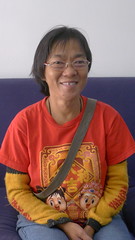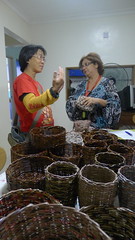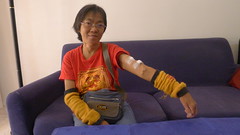Toh Oy Sim, one of the newest Salaam Wanita eco-basket weavers, exudes positivity when she steps into the eH office.
Like many of the weavers, Toh perseveres in the face of adversity and maintains a positive outlook on life. She was kind enough to share some of her story with Anne, the eco-basket coordinator who generously acted as our translator, and me.
Toh began by recounting the year she turned 28. That year was a turning point in Toh’s life and one of one of emotional highs and lows. She happily married her husband and was hopeful about what the future might hold for them both. A few months later, her blood pressure started to rise and her health declined. She felt feverish for about two weeks, and when her condition didn’t improve she went to see her physician. After running several tests, the doctor informed Toh that her high blood pressure had adversely affected her kidneys, which were shrinking and malfunctioning as a result. He advised Toh to start undergoing dialysis to stabilize her condition.
When the kidneys are no longer capable of filtering waste products from the blood, dialysis rids the body of toxic substances and helps cells and organs maintain a proper balance of electrolytes. Toh visits the Dialysis Center for treatments three times per week in the afternoon for four hours each. Three dialysis treatments at the Center cost 390 RM ($130 USD).
In the years following her diagnosis, Toh decided not to have any children because of the health risks associated with her failed kidneys. Pregnancy would have also required her to go to dialysis every single day, which was a daunting prospect.
These days, when Toh goes to the Center for treatment, she does so alone. She seldom sees her husband because he is a truck driver and spends most of his time away from home.
It has been 16 years since Toh was first diagnosed with kidney failure. Her inconsistent health record has made it difficult for her to find steady work. Another barrier Toh has faced is her limited education. She stopped attending school when she was 15 years old to help raise her Aunt’s children.
Toh’s health issues and personal circumstances have only made her want to work harder. Participation in the Salaam Wanita eco-basket project has given her an opportunity to work from home. Toh is extremely grateful for this opportunity because the income helps cover some of her medical and household expenses. She first became involved in the eco-basket project four years ago, when she started rolling magazine paper for the experienced weavers to make baskets. This is one of the most difficult and time-consuming parts of making the baskets, but Toh has mastered the technique.
Over the past year, Toh has been learning how to make the baskets herself. She is one of 12 women who were selected to attend basket-weaving trainings under a grant from UBS. Toh has shown great improvement in the shape and weave of her baskets. She is proud of her progress because it isn’t easy for her to pull the paper tightly due to weakness and sensitivity in her left arm.
I noticed that each time Toh came to the eH office, she was wearing wool arm warmers in Malaysia’s oppressive heat. Toh pulled the fabric up and showed me a golf-ball sized protrusion on the inside of her left arm. She put my hand on top of the mass and I could feel the area vibrating.
When I asked Toh what the bulge was, she wasn’t sure how to explain it. I consulted with a doctor and it is likely a fistula, or enlarged vein that is connected to an artery to increase the blood flow through the vein. In turn, the fistula makes it easier to insert needles to remove the blood and perform haemodialysis to clean it and return it to the body.
Toh organizes her schedule around dialysis, but she does not let it consume her life. While her blood is being cleaned, she continues to roll magazine paper. At the end of the day, the baskets she’s made fill her with pride.
When she comes to the eH office to drop off her completed baskets, she radiates with satisfaction and a sense of accomplishment.
Posted By Maria Skouras
Posted Apr 19th, 2011




